The Intel Core i7-8086K Review
by Ian Cutress on June 11, 2018 8:00 AM EST- Posted in
- CPUs
- Intel
- Core i7
- Anniversary
- Coffee Lake
- i7-8086K
- 5 GHz
- 8086K
- 5.0 GHz
Benchmarking Performance: CPU Encoding Tests
One of the interesting elements on modern processors is encoding performance. This includes encryption/decryption, as well as video transcoding from one video format to another. In the encrypt/decrypt scenario, this remains pertinent to on-the-fly encryption of sensitive data - a process by which more modern devices are leaning to for software security. Video transcoding as a tool to adjust the quality, file size and resolution of a video file has boomed in recent years, such as providing the optimum video for devices before consumption, or for game streamers who are wanting to upload the output from their video camera in real-time. As we move into live 3D video, this task will only get more strenuous, and it turns out that the performance of certain algorithms is a function of the input/output of the content.
All of our benchmark results can also be found in our benchmark engine, Bench.
7-Zip 9.2
One of the freeware compression tools that offers good scaling performance between processors is 7-Zip. It runs under an open-source licence, is fast, and easy to use tool for power users. We run the benchmark mode via the command line for four loops and take the output score.
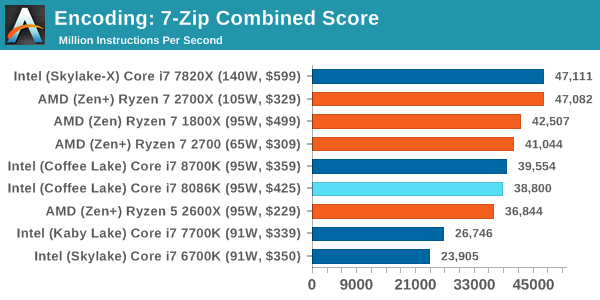
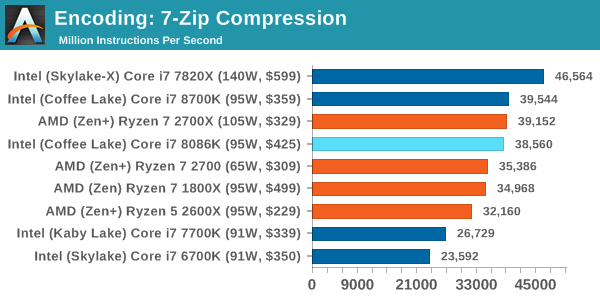
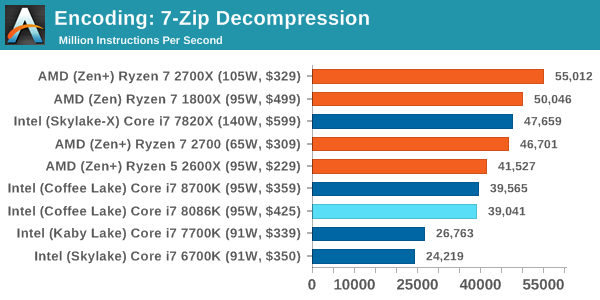
Again, trading blows with the 8700K, but falling behind a little bit.
WinRAR 5.40
For the 2017 test suite, we move to the latest version of WinRAR in our compression test. WinRAR in some quarters is more user friendly that 7-Zip, hence its inclusion. Rather than use a benchmark mode as we did with 7-Zip, here we take a set of files representative of a generic stack (33 video files in 1.37 GB, 2834 smaller website files in 370 folders in 150 MB) of compressible and incompressible formats. The results shown are the time taken to encode the file. Due to DRAM caching, we run the test 10 times and take the average of the last five runs when the benchmark is in a steady state.
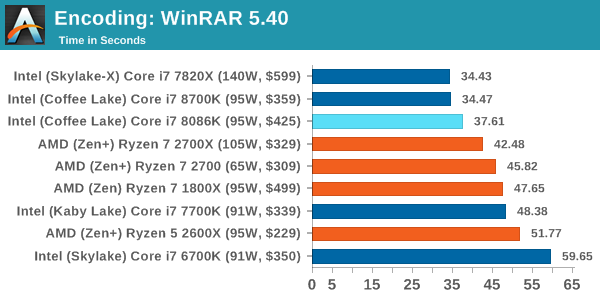
The 8086K takes another benchmark sitting behind the 8700K.
AES Encoding
Algorithms using AES coding have spread far and wide as a ubiquitous tool for encryption. Again, this is another CPU limited test, and modern CPUs have special AES pathways to accelerate their performance. We often see scaling in both frequency and cores with this benchmark. We use the latest version of TrueCrypt and run its benchmark mode over 1GB of in-DRAM data. Results shown are the GB/s average of encryption and decryption.
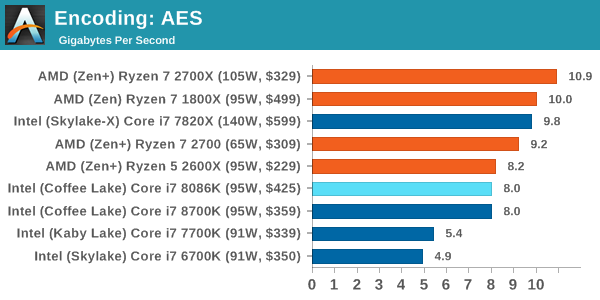
Under AES encoding we get literally identical results.
HandBrake v1.0.2 H264 and HEVC: link
As mentioned above, video transcoding (both encode and decode) is a hot topic in performance metrics as more and more content is being created. First consideration is the standard in which the video is encoded, which can be lossless or lossy, trade performance for file-size, trade quality for file-size, or all of the above can increase encoding rates to help accelerate decoding rates. Alongside Google's favorite codec, VP9, there are two others that are taking hold: H264, the older codec, is practically everywhere and is designed to be optimized for 1080p video, and HEVC (or H265) that is aimed to provide the same quality as H264 but at a lower file-size (or better quality for the same size). HEVC is important as 4K is streamed over the air, meaning less bits need to be transferred for the same quality content.
Handbrake is a favored tool for transcoding, and so our test regime takes care of three areas.
Low Quality/Resolution H264: Here we transcode a 640x266 H264 rip of a 2 hour film, and change the encoding from Main profile to High profile, using the very-fast preset.
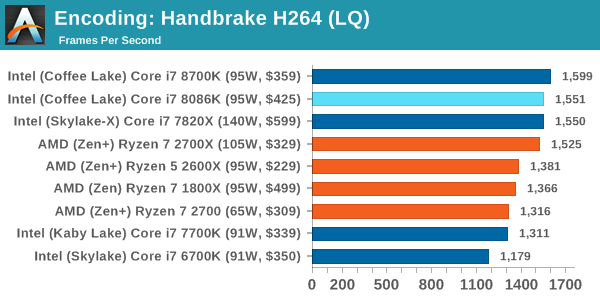
High Quality/Resolution H264: A similar test, but this time we take a ten-minute double 4K (3840x4320) file running at 60 Hz and transcode from Main to High, using the very-fast preset.
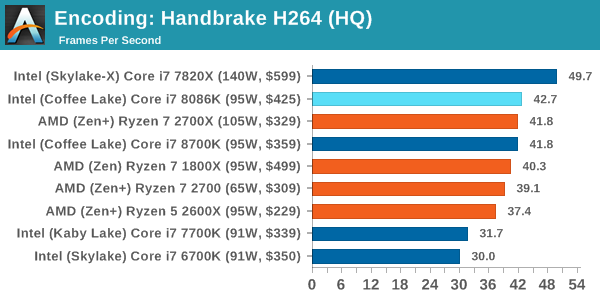
HEVC Test: Using the same video in HQ, we change the resolution and codec of the original video from 4K60 in H264 into 4K60 HEVC.
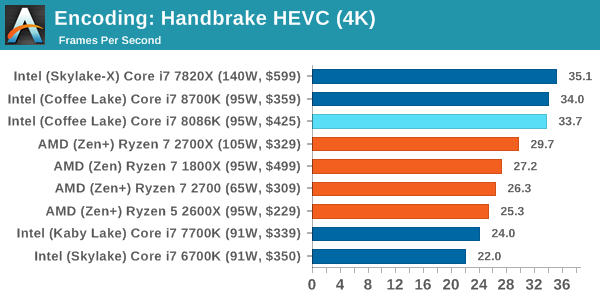










111 Comments
View All Comments
rocky12345 - Monday, June 11, 2018 - link
They used to but Intel coolers are so bad that no one used them so instead of making one that was usable for the k CPU's they just stopped including them. At least the other guys include them still and 2 of the 3 are actually usable as coolers. Personally I would rather have some sort of cooler included so at least would be up and running if the high end air or water cooler was om back order or waiting on shipping at least can get the system built and running.Flunk - Monday, June 11, 2018 - link
The ones they sent out with the older -K series processors were a joke. My i5-2500K came with a cooler that couldn't even cool it within Intel's specs running stock in a cold room.mkaibear - Tuesday, June 12, 2018 - link
I'm still using the one which came with my 4790K and it works fine, and the one my 2500K came with also worked fine when I had it, even at 30C ambient temps in the middle of summer.Probably an installation error there Flunk.
(yes, I bought K series processors and never overclocked them, for both of these my intention was to downclock them for reduced heat and noise but never got round to it with the 2500K and the 4790K didn't really downclock very well so I couldn't be bothered!)
jimmysmitty - Friday, June 15, 2018 - link
Absolutely incorrect. I installed tons of the stock Intel coolers on i5s and i7s and they work as specified for the stock settings of the CPUs plus were normally very quiet.SirMaster - Monday, June 11, 2018 - link
"K" CPUs con't come with heatsinks or fans... Neither does the 8700K or 8600K or 7700K, etc.Matthmaroo - Monday, June 11, 2018 - link
It’s been a while for you , I see - K series cpus have no coolerMemo.Ray - Monday, June 11, 2018 - link
Memo.Ray - Monday, June 11, 2018 - linkAs I mentioned in my comment in the other article a couple of days ago:
Intel managed to give away 8086 "binned" 8700K (AKA 8086K) and still make some money on top of it. win-win situation :D
https://www.anandtech.com/comments/12940/intels-co...
jimmysmitty - Friday, June 15, 2018 - link
And you miscalculated because you used the i7 8700 cost not the 8700K cost. They made maybe $300K on them.You know I have never seen anyone complain about say a 40th anniversary version of a car.
just4U - Wednesday, June 13, 2018 - link
If it were more similar to the 4790K with a better thermal design (think devils canyon..) it's something I'd be interested in over the 8700K. It's not tho… and doesn't even come with a specialty cooler that might peak interest.. but rather "NO COOLER" at all.. I dunno..I think Intel missed the boat with this one.
MDD1963 - Tuesday, June 26, 2018 - link
Who *actually* thought, after so many years of Intel not giving coolers with it's "K" model variants, that this one might come with a bundled cooler? :)